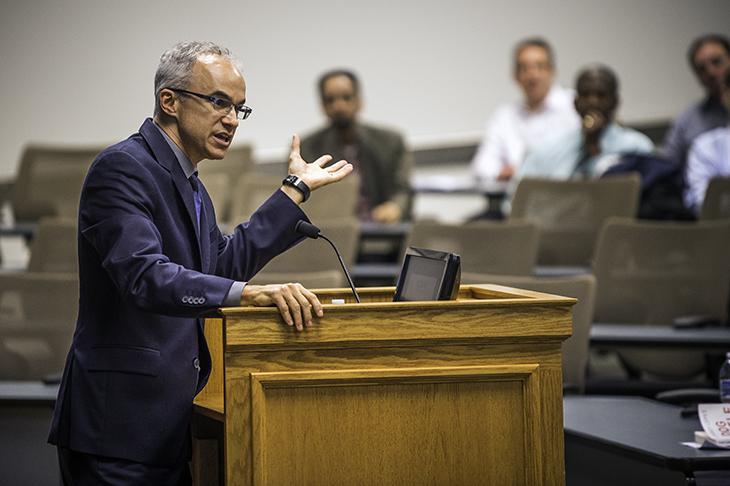Take fear, resentment out of politics, Dreyfous lecturer says
What critics call racist appeals by presidential candidate Donald Trump actually reflect divide-and-conquer politics that the Republican Party has practiced for 50 years, to the detriment of middle class Americans of all colors, University of California, Berkeley, law professor Ian Haney López told an audience at Tulane Law School on Monday (March 14).
The remedy, he said, is a vision of “we” that isn’t fragmented, recognizing that race is a wedge that politicians use to win white votes, ultimately causing further economic inequality.
“We have to pay attention to race because race is structuring our economy and jeopardizing the well-being of the 99 percent,” Haney López said during the 41st Dreyfous Lecture on Civil Liberties and Human Rights. The event honors legendary Louisiana civil rights advocates George Abel and Mathilde Schwab Dreyfous.
Haney López called “dog-whistle politics” — the use of racial code words — a tactic that promotes race-based fear and hatred of government while building support for policies that benefit the very wealthy but damage the middle class.
Trump’s candidacy has forced to the surface a long-developing “festering wound of racial fear and resentment,” Haney López said, but suggested that most Trump supporters aren’t white nationalists but “good, decent folks who are stressed about the economy and about the changing face of the country.”
Those anxieties must he addressed, Haney López said, by giving people “a positive sense of what it means to be American, to be in this together, to really be part of a ‘we’ that embraces everybody and that refuses to be divided by fear and resentment.”
He urged countering the Republican narrative that whites are being disrespected and undercut.
“It is absolutely essential that we give everybody in this country a way to be proud of who they are and what they contribute, when they see themselves in each other and refuse to be divided against each other, against other working people.”
Watch the lecture in this video.
Linda P. Campbell is Tulane Law School’s director of communications.

